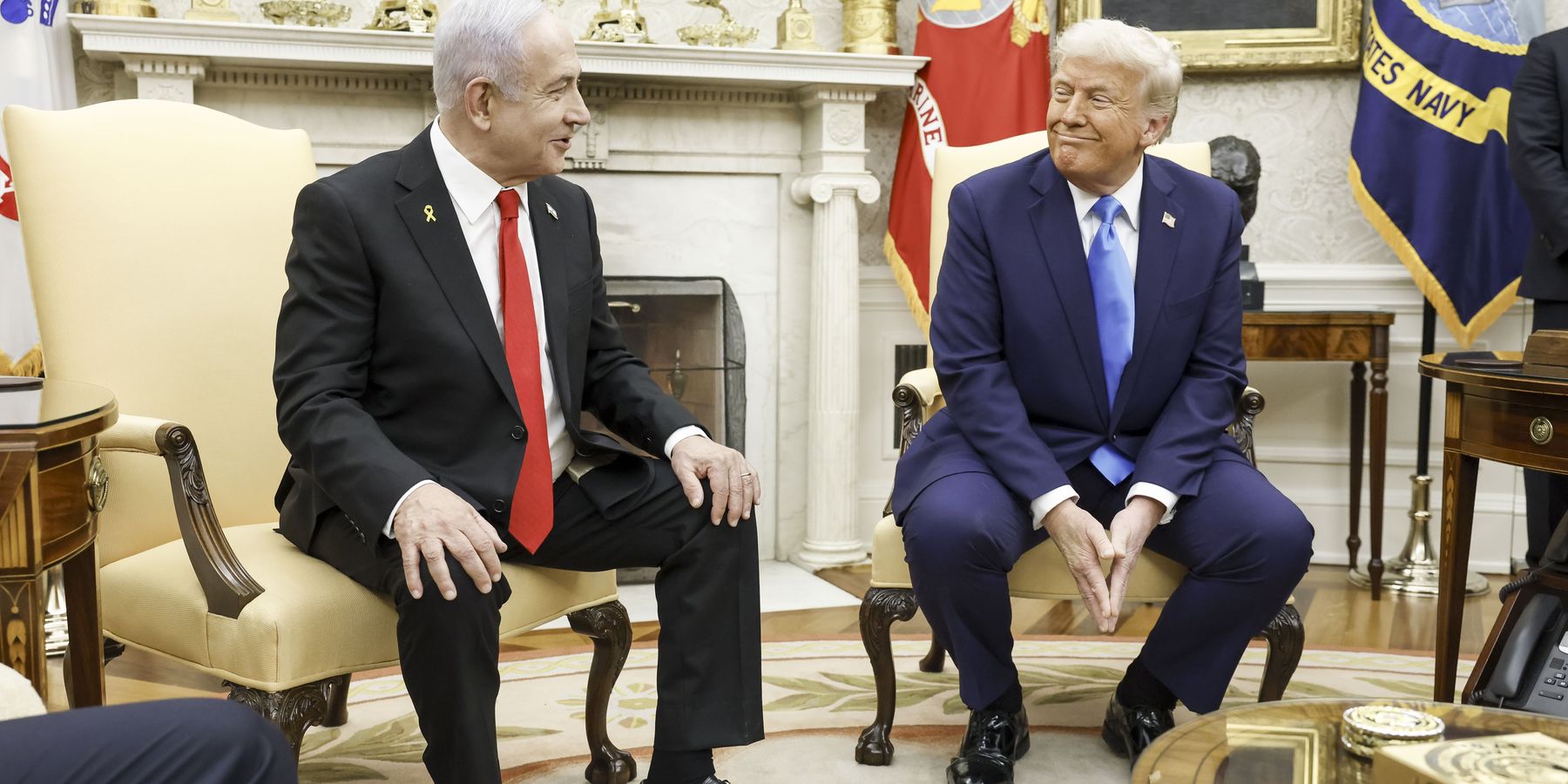From his days as a scrappy 2016 candidate in the wake of the 9/11 "forever wars" Trump has been pretty adamant that the United States should not be in the business of "nation building" or putting our men and women in uniform in harm's way to solve other countries' problems. Until now, it seems.
In remarks that sent shock waves across the American political spectrum, left and right, Trump said he wants the U.S. to empty the Gaza strip of its nearly two million inhabitants, and develop it like a property owner. In fact he said he wanted the U.S. to "own it" and did not rule out sending our troops to get the job done. Here's the video.
"The U.S. will take over the Gaza Strip and we will do a job with it too," he said, with a smiling Benjamin Netanyahu next to him.
"We'll own it and be responsible for dismantling all of the dangerous unexploded bombs and other weapons on the site, level the site and get rid of the destroyed buildings, level it out. Create an economic development that will supply unlimited numbers of jobs and housing for the people of the area. Do a real job, do something different."
He claimed that leaders all over the Middle East think it's a great idea and that it won't be a rebuilt place for "a specific group of people" but for people "all over the Middle East."
Trump won in 2016 and in part in 2024 because he railed against the status quo military adventuring of the past 25 years and especially nation building. His efforts to withdraw from the Afghanistan War were born out of a conviction that the 20 years spent there trying to remake the society while fighting the Taliban was a sheer waste of American blood and treasure. The contradiction was not lost on shocked observers on Tuesday night.
Rep. Warren Davidson, (R-Ohio), a supporter of Trump, just offered one question: "America First?"
In comments on X early Wednesday morning, Senator Rand Paul made it clear this was not. "The pursuit for peace should be that of the Israelis and the Palestinians. I thought we voted for America First. We have no business contemplating yet another occupation to doom our treasure and spill our soldiers blood," he wrote.
"I’d like to ask Trump how this magical, unicorn Gaza vision jives with his 'we need to get out of the Middle East' messaging,“ blasted Daniel DePetris of Defense Priorities.
"President Trump has long prioritized lowering the U.S. military footprint in the Middle East and encouraging peace deals. This is the opposite of that,” charged Adam Weinstein, Middle East fellow at the Quincy Institute, also a veteran of the Afghanistan War.
“The president’s proposal of occupying Gaza hits the trifecta of bad ideas," he added. "It’s simultaneously illegal, unethical, and terrible for U.S. interests. Whether said in earnest or as some perverse form of leverage, it’s already damaging and should be reversed.”
Trump's Democratic critics came out reliably swinging. Sen. Chris Murphy (D-Conn.): "He’s totally lost it. A U.S. invasion of Gaza would lead to the slaughter of thousands of U.S. troops and decades of war in the Middle East."
But as reports started rolling it was clear that Republicans were baffled by the turn of events, too. It takes a lot, as they say, to show Sen. Lindsey Graham (R-S.C.) a war he doesn't want (your sons and daughters) to fight. "I think that would be an interesting proposal," he said carefully. "We’ll see what our Arab friends say about that. I think most South Carolinians would not be excited about sending Americans to take over Gaza."
“I think that might be problematic. But I’ll keep an open mind,” he added. “That would be a tough place to be stationed as an American, would be Gaza."
Trump's other supporters tip-toed a bit but their confusion was palpable.
Sen. Josh Hawley, (R-MO) "I don’t know that I think it’s the best use of United States resources to spend a bunch of money in Gaza. I think maybe I prefer that to be spent in the United States first, but let’s see what happens.”
For the record, Sen. Jon Fetterman, (D-Penn), big Israel supporter throughout the conflict, doesn't think it would be a bad idea to throw American soldiers into a Middle East furnace.
“I don’t know what the role [of U.S. forces] is, but they’re obviously a part of it, and I fully support,” he declared.
Remember that when you have to wave a bunch of 21-year-olds off to provide security in the Gaza "security vacuum." Remember how certain politicians said it would never happen again, under their watch.
For his part, Trump says, "everybody I've spoken to loves the idea of the United States owning that piece of land, developing and creating thousands of jobs with something that will be magnificent in a really magnificent area that nobody would know." This is his version of "government in a box" and "being greeted with flowers and candy," and even "cake walk." Let's hope he — we — don't have to learn, again, how this ends.
This story has been updated.
- Israel to receive $1 billion in bombs and bulldozers from Trump ›
- Trump can't 'clean out' Gaza without destabilizing entire region ›
- Trump signals death knell of two-state solution | Responsible Statecraft ›
- Trump's Gaza vision would be US counterinsurgency failure 2025 | Responsible Statecraft ›
- Trump's Gaza plan is not America First | Responsible Statecraft ›
- Did the White House help engineer a new siege of Gaza? | Responsible Statecraft ›
- AP: US officials want to send Palestinians to Sudan, Somalia | Responsible Statecraft ›
- Trump considering US-led Iraq-style occupation of Gaza | Responsible Statecraft ›
















